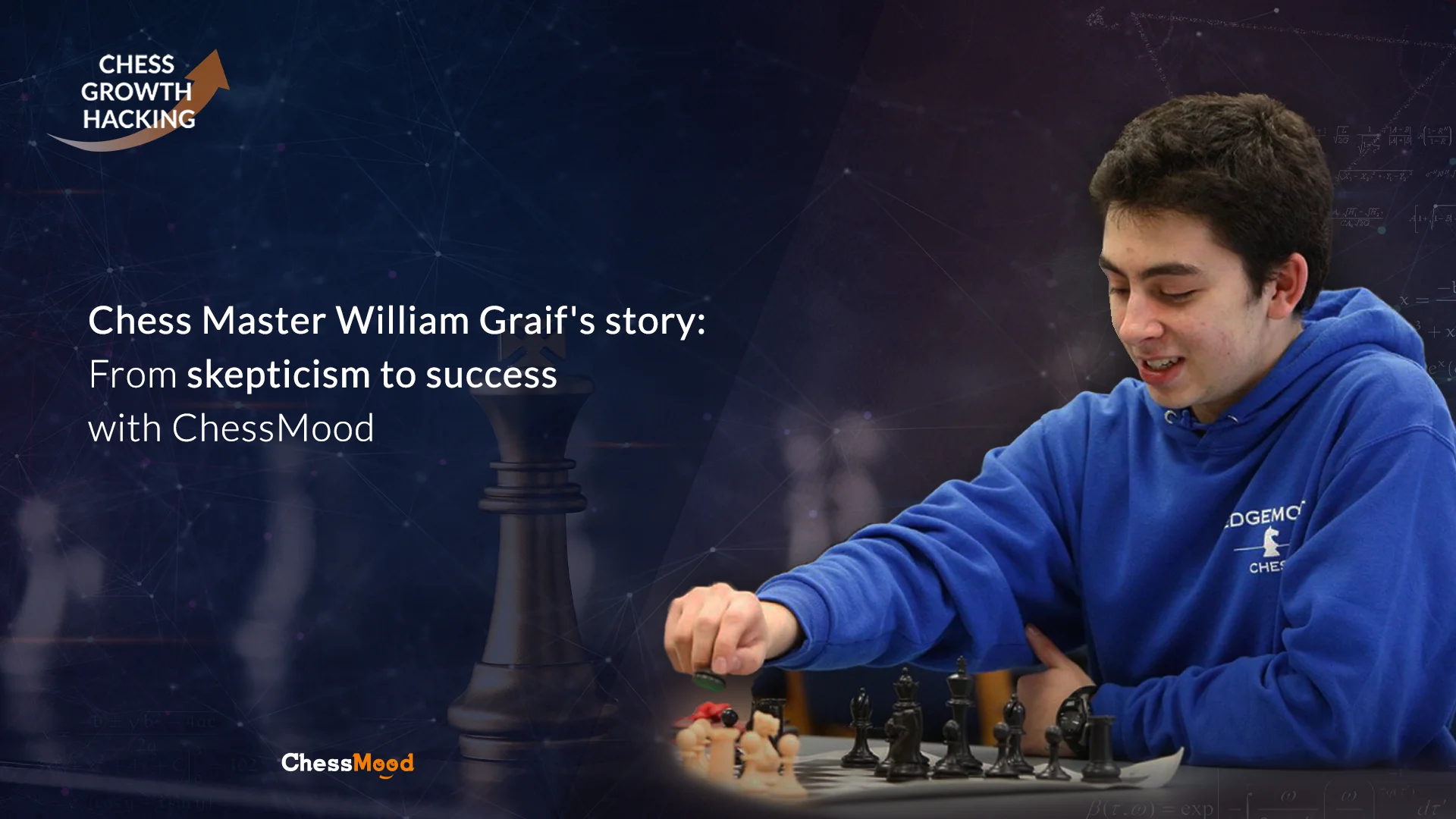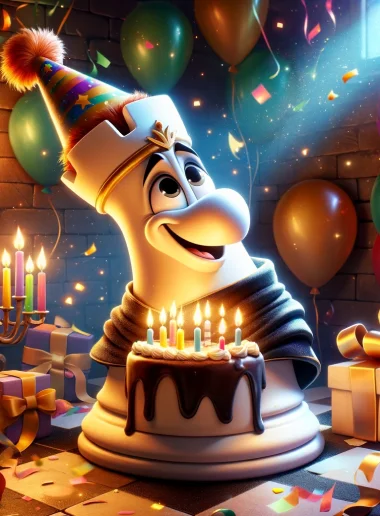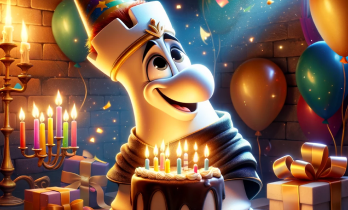Chess Master William Graif's story: From skepticism to success with ChessMood
Discover how he elevated his chess and mindset by implementing what he learned from ChessMood. Read his remarkable transformation story.
Discover how he elevated his chess and mindset by implementing what he learned from ChessMood. Read his remarkable transformation story.

“It was around 2018. My FIDE rating was like 2100. I wasn't making much progress at all. Then I saw ChessMood when it was like a Facebook group. Avetik was talking about all these ways you can improve chess and life.”
Initially, William was skeptical.
“There are people who claim a lot of things across the internet. So, I first sent a couple of my games for a free review, which he did very well. And so I realized this isn't just some random guy with some ‘become a GM quick!’ scheme. I was very impressed with the analysis and his approach to the game.”
“So I started doing lessons with Avetik. After the launch of the ChessMood website in February 2019, Avetik recommended watching the courses from there so he doesn’t teach me what’s already recorded. This way, we could spend our lesson time more effectively.”
“I was doing a lot from the ChessMood courses. It makes it easier to train if the courses are so guided. I would watch the courses, make my PGN files and check them with Avetik often. But, above all, I had to play these openings, which were brand new to me, in my online games. So I got a ton of experience that way.”
“Eventually, I revamped my opening repertoire. And ChessMood would go on to change my outlook on chess and life.”
William would soon have the opportunity to test his new repertoire in a major tournament in 2019 – the Canadian Junior Championship.
To perform his best, William had to face his old nemesis and break free from its shackles.

“Throughout school, I would go to nationals every year. In the first 5 rounds, you need to beat all these lower-rated players before playing the top seeds.”
“At first, it worked out very well. But as soon as I lost my first game in that sort of thing, I hated that feeling and began to fear losing. So instead of just playing my game, I was afraid of the outcome. I'd be relieved if I won and very upset if I lost.”
Once William was aware of this mental limitation, breaking free from the fear of losing was as simple as detaching himself from the result.
“I remember distinctly going into that tournament (Canadian Juniors) where I was at peace with almost any outcome. I wasn't the highest rated there, but I was happy. ChessMood taught me to enjoy chess again without stressing so much about the results.”
At the Canadian Junior Championship, William wasn’t the top seed, not even in the starting top 10. All he was focused on was giving his best while being at peace with the outcome.
“It was the first time I played the new opening repertoire of ChessMood in classical games. It worked extremely well.”
Here’s one of his victories in the event, from the Closed Sicilian with 2…Nc6.
William continued to stack up victories and dominated the field.
With his phenomenal performance, he became the Canadian Junior Champion with a round to spare!

Complete Domination
He went from being seeded outside the top 10 to winning the tournament!

With the trophy
A month after William became the Canadian Junior Champion, Avetik was traveling to the US.
“So back in October 2019, Avetik was coming to St. Louis for a tournament (Fall Chess Classic), which I excitedly followed.”
After the tournament, Avetik accepted the invitation of one of our earliest students, Bhabatosh Chowdhury, to stay at his home in Chicago and explore the place.
And since William was a student at the University of Chicago, he knew the chess community there.
“I connected Avetik with Nathan Kelly and the Chicago Chess Blitzers. They also arranged a blitz match against the local blitz legend NM Gopal Menon (Avetik won).”
One evening, Nathan invited Avetik to blitz, which he accepted. And with Bhabtosh, he went to the place where they would play.
“Avetik came to our casual blitz spot at the McDonald’s on Halsted Street.”
And while Avetik was playing blitz at McDonald’s, William showed up next to his board! It was a big surprise. After some high-fives, William also joined in on the blitz games.
“We had a great time, and it was definitely a cool experience for all the guys to get to play with a GM! We all loved it.”

GM Avetik with the Chicago Blitzers and ‘Queentin Kingantino’ t-shirt
After Avetik returned home from his US trip, they resumed their training. With his impressive performance in 2019, William’s rating jumped from 2100 to 2200 FIDE elo.
But then COVID struck.
He still continued training even if there were no tournaments. There was one goal he wanted to achieve very badly – to become a FM. And when the playing season opened, even school couldn’t stop him.
In late September 2021, he sensed an opportunity to play 5 tournaments across Europe.
However, playing the tournaments would mean temporarily sacrificing university studies. But because William was determined to get the title, he went all in on chess!
“It was a decision I made only a week before the school year began. I could graduate from UChicago (University of Chicago) next quarter and was still graduating early.”
That time, he had an elo of 2231, needing just 70 more points to become an FM.
“I flew to Armenia for the ChessMood Open in late September 2021. It didn’t go well at all. I remember I had 3/9 points. I was very upset.”
It was tough playing in a tournament with so many underrated Armenian kids. William lost around 15 elo, taking him further away from his goal.
“They say ‘you always gotta believe’ and ‘never give up’. But I think what that mindset misses is the learning aspect. True resilience isn’t brushing past your failures; it’s confronting them. To see what you can do better next time. That’s really the hardest thing to do, but it’s also the best thing to do.
And this was genuinely a really low point where I didn't know if I was gonna make my goal of becoming an FM.”
But like a true champion, he had the humility to ask for help and be open to change.
“So what I'm proud of was that I turned it into something constructive. I talked with Avetik. He fully believed in me and was like, ‘okay, this is what we're gonna do.’
Instead of playing in the 2nd tournament (Yerevan Open), William decided to focus on fixing his weaknesses to prepare for the remaining 3 tournaments.
“I didn't play the 2nd tournament. I went to Yerevan anyway and trained with Avetik and Gabuzyan. They dedicated a lot of time to me each day to training in person.”

Yakko, Avetik, Any, William

William with Yakko
“I was genuinely enjoying chess as much as I ever had been, and that was the most important thing for me.”
“At the Chessmood Open, I struggled with time trouble.”
Rather than burying his head in the sand, William confronted this problem.
“I knew Gabuzyan as the guy who would spend 10-15 minutes on his clock even in a classical match, no matter who he played, be it a very strong GM or a much lower-rated opponent.”
“Gabuzyan helped me a lot in thinking in my opponent's time, showing how to cause psychological stress by moving almost immediately and never giving the opponent a break, making it seem like you're in control. That was definitely something that I took home with me.”

GM Gabuzyan shares many more practical tips in the course In Gabuzyan’s Mind
This approach transformed William into a fearsome opponent, and it would soon bear fruits.
“I was just the happier person in Budapest and a better chess player. I had seen so many new patterns, games, and ideas. I was so excited to play and didn't fear losing my rating.”
This detached and optimistic state of mind showed in William’s performance. “My first tournament in Budapest went great. I scored 6/9. I almost got an IM norm.”

1st tournament in Budapest – Gaining 33 elo
The 2nd tournament didn’t start the way William wanted…
“I lost the first two rounds. I was being way too aggressive.”
Due to the losses, it’s very human to doubt one’s capabilities.
“It was also a very low point because I was like – okay, was the last tournament a fluke? Am I being too carefree? I wasn't sure what my strength was.”
“Avetik was saying, ‘oh you know, I think you can probably be like 2400 strength.’ I was questioning things after losing those first two rounds.”
How would you approach things if you were in William’s shoes? After such a discouraging start, many would look to play it safe. But not William.
“I think the best thing I did was not change. I didn’t overreact or panic. I had faith it'll work and that I’m in control.”
Sticking to his aggressive approach was worth it, as William bounced back with 4 wins in a row! He continued his impressive run, and the final test would come in the last round of the tournament when he was paired against the top seed.
William was paired against the top seed. The game started with the French 3.Bd3 line and turned out to be a masterpiece.
“I just genuinely outplayed him in an endgame. It gave me a lot of confidence that I straight up outplayed someone that strong.”
With this victory, William crossed 2300 elo and officially became a Fide Master!

2nd tournament in Budapest – Gaining 51 elo and FM title!
After a bad start to the Europe trip, even William thought he was far away from the FM title.
Yet, it took him just 2 tournaments (just two!) to go from 2216 to 2301.
Once again, being detached from the outcome was the key!
“I didn’t attain that FM title until I was satisfied with not keeping that as the goal.”
He also played in a 3rd tournament, where he again had an outstanding performance, wrapping up his dream run in Budapest with 4 wins in the last 4 rounds!

Performance from the 3rd tournament – Gaining 31 elo
In all, William had raised over 116 elo in just 3 tournaments in Budapest!
When things go wrong, you should often step back, fix what’s not working, and then move forward. That’s what William did after performing poorly in the first tournament. He was also courageous enough to ask for help and to fix his mistakes.
Behind this phenomenal performance was his commitment to the process.
“Throughout that time, I was so immersed in chess. I'd walk to the tournament hall and play. I’d call my girlfriend, call my family on the way back. I’d review my game and prepare for the next one.”

Immersed in chess | Pic credits: William
“It was like a really rare thing in my life. Just before graduation, I could focus on chess and travel Europe. I have really positive memories of just doing just that.”
While in Budapest, William also represented the University of Chicago chess team in the Collegiate Chess League.
“I was blessed with incredible teammates like GM Awonder Liang and GM Praveen Balakrishnan, FM Kapil Chandran and Christoph Eichinger.”
Since the matches were held online, William could participate in them from his hotel room in Budapest.
“It was good that the CCL lined up with me being in Budapest because I was playing the best chess of my life.”
“I scored 2.5/4 against the University of Missouri GMs, which was tremendously helpful. And then Awonder and especially Praveen, who completely destroyed all their fellow GMs. A lot of GM-on-GM crime there and in the playoff run.”
“UChicago won the Collegiate Chess League, which was an incredible achievement for a non-scholarship University. It was a great moment for me and my teammates.”

The UChicago chess team
William acknowledges the support he has received to be at the place where he is today.
“My family is number one. They took me to all of these tournaments and for everything they did.”
“My first coach Sunil Weeramantry, Hikaru Nakamura’s stepfather, runs the National Scholastic Chess Foundation. He coached me until I was about 18.”
“Then there’s Avetik, ChessMood, Gabuzyan, and just everybody there. The whole team provides such excellent chess courses. Avetik always believed in me, especially after my first tournament went poorly. I cannot thank him enough for supporting me through all that.”
“And yeah, my girlfriend was very supportive and would talk to me before and after each round. She didn't even know chess before she met me. I taught her the rules. She took such an interest, plays all the time herself and for UChicago Chess, and offered her advice on various things. It really helped keep me motivated.”
“I owe undying gratitude to many more.”
For William, the benefits of chess go far beyond the 64 squares.
“Chess has helped me in so many endeavors outside of it. In my current job, you look at a large amount of data and find patterns, very similar to the things you do over a chessboard.”
And just like chess has made such a big contribution to his life, he also wants to do the same for the game.
He has a Youtube channel where you’ll often see him inventing crazy gambits.
“I love making opening innovations to add to the theory of chess – to find something that nobody else has found yet, or to improve on something that people thought couldn't be played.”
One of his innovations was in the French McCutcheon Gambit, where he found a way to sacrifice 2 pawns.

When GM Avetik showed him the above position for the first time, William’s first reaction was – ‘Ah, what if Black castles here?’
To explore this line further, William researched it on his own. The next day he shared with Avetik how deadly the 7…0-0 move is – the idea is to race ahead in development before launching an attack against the White King.
Avetik shared William's suggestion with our student (also our investor), who used it in their game. And here’s what happened:
Favorite players from the current generation.
Nodirbek Abdusattorov and Liang Awonder.

Nodirbek & Liang | Credits: chess.com
Favorite players from the past generation.
Bobby Fischer. It’s impressive how far ahead of his time he was.
I love a lot of Morphy’s games as well. I love that romantic era of chess in general.
Your favorite ChessMood course.
I like the Closed Sicilian with 2.Nc3 Nc6.
What’s your Right Mood ritual?
I kind of imagine every outcome of the game – how I feel after I win or lose and just being okay with it in the grand scheme of things.
People think there's some false dichotomy that if you're not super toxic about losing, you'll lose your competitive edge. That’s just not true.
You can do your absolute best and still be psychologically at peace.
I also like to recall moments from my past, like winning Canadian Juniors, making FIDE Master, and thinking about the moments when I was enjoying the game so much.
The favorite memory chess has given you.
The game that I became a Canadian Junior Champion.
Towards the end of that game, when the result was clear, I was overflowing with the feeling that, okay, I worked so hard and could actually achieve my goals.
Another is when as a coach, the kids come out and scream, ‘I won’ at these Nationals for Hunter College Elementary School, where I teach. You worked with those kids and prepared them for those games. And it's just amazing, seeing them so happy and fulfilled. Those sorts of moments I'll never forget.
What advice would you give to someone who’s new to the game and wants to achieve a title someday?
You gotta love it.
I think the biggest key to improving at chess is immersing yourself in chess.
If you're playing chess, reviewing your games, doing tactics, courses instead of watching TV because it’s genuinely what you want to do, then that's the best thing. You'll improve this way.
What’s a life lesson you’ve learned from chess?
Deal with your failures.
The ability to achieve your goals to work hard and to take failure constructively.
If goddess Caissa could give you a chess superpower, what would you prefer it to be? Which chess superpower would you like to have?
The ability to look at every game ever played and reference that.
Thank you for reading! We congratulate William on achieving his goal and wish him the best for the future! You can share your comments and wishes with William in our forum thread.
Originally published Feb 21, 2023

